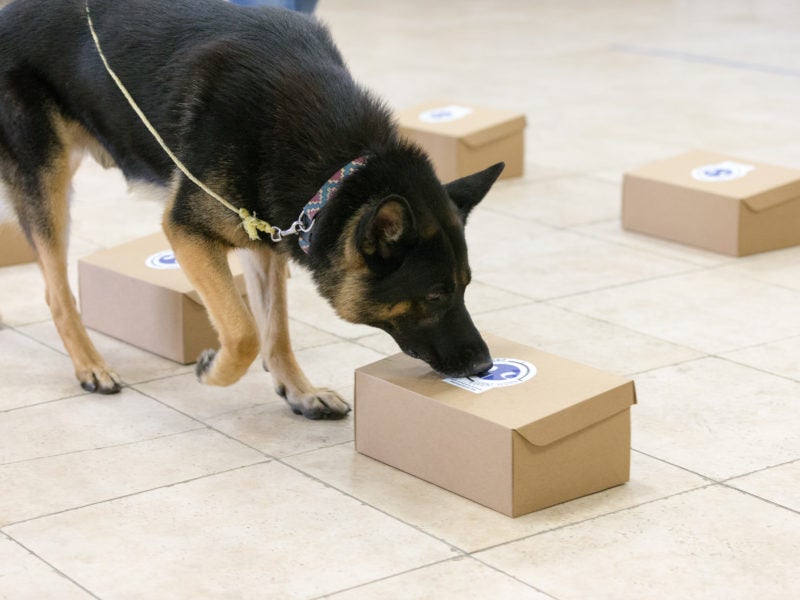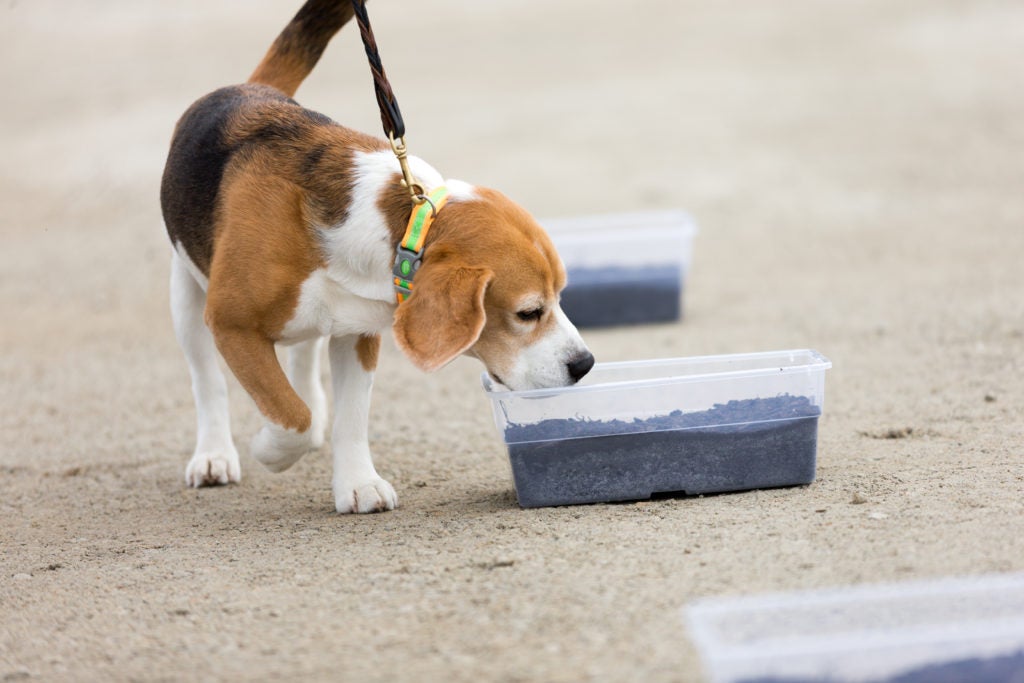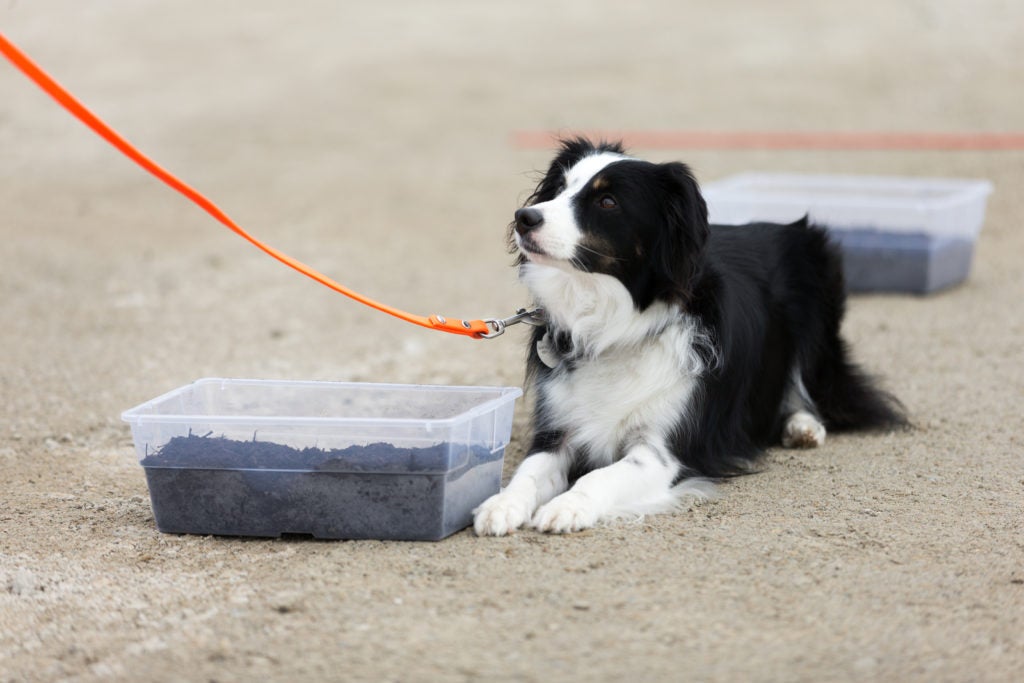
The sport of AKC Scent Work® makes a game out of your dog’s favorite activity — sniffing. Scent work asks a dog to locate a hidden cotton swab scented with essential oil. Besides being incredibly fun, the sport has many benefits, and any dog, purebred or mixed breed, is welcome to compete.
Why Try Scent Work?
Scent work allows a dog to do what he does best. Participant Shaefer Sides trains scent work with all three of his dogs, each a different breed and temperament. “A scent work trial or practice gives Buddy a positive, enjoyable outlet for his natural desire to hunt. Dasha and Jake love to train because it is mentally stimulating, and they get to use their noses to earn a food reward.”
Jennifer Redfern loves watching her German Pinscher, Winston, doing scent work. “He smiles, and his eyes sparkle. His movement is joyful, even when he is down to business,” she says. She attributes his joy to an activity that is allowing Winston to follow his heritage. By tapping into what he was bred to do, scent work makes for a very happy dog.
Milissa Carrig loves scent work so much that she became an instructor. Her favorite part of scent work has been watching her Bloodhound, Ruger, grow in the sport. She also enjoys “seeing my students be amazed by their dogs and the gifts they possess.”

Benefits of Scent Work
Sides is passionate about the benefits of scent work and believes it’s a positive experience for dog and handler. He has seen shelter dogs and timid dogs gain confidence from participating, while also observing improvements in their behavior and attitude.
Norine Noonan’s standard Poodle, Paris, is very serious and the diva of Noonan’s pack. Yet it’s obvious she finds scent work fun and has gained confidence from the independent aspect of the sport. Noonan says, “From the moment I tell her to seek, she is fully engaged in the game, and when she signals her alert, she looks at me as if to say, ‘It’s right here, don’t you smell it?’” Noonan feels their bond has strengthened as they have learned to trust each other even more.
Redfern also feels an increased sense of trust with her dog. The better they become as a team, the more confidence they have in their skills. She believes that scent work also helps Winston burn off excess energy and gives him a sense of accomplishment. “Fifteen minutes of drills settles all three of my dogs and lifts their spirits,” she says.
Make sure if you’re training scent work at other dog events that you remove and properly dispose of the odor when you’re finished — you don’t want another scent work-trained dog stumbling on the odor and getting confused!
Derby, the Standard Schnauzer, burns off steam with scent work. His owner, Jennifer Kimberlin, says “calm” and “rest” are not in his vocabulary. Her dog likes to think, and scent work provides new and unique challenges for him. The scents are the same each time, but their locations are always changing, and that keeps Derby engaged.
Kimberlin emphasizes the importance of teamwork. Although Derby works independently, Kimberlin must stop and listen to her dog, which increases their connection. “When he finds the odor, and I trust him and call it, then praise him, that shows him that I listen and believe him.” A strengthened relationship can benefit any handler and dog in other areas of their life, including other dog sports.

Boosting Other Dog Sports
Because scent work gave his hound a rewarding outlet for using his nose, Sides saw an unexpected improvement in his Beagle’s agility performance. “Before training in scent work, Buddy would run the agility course with his nose to the ground, at his own slow speed, maybe paying attention to me, maybe not.” After nine months of scent work training, Buddy became more focused during agility training, spent less time sniffing the course, and sped up a bit.
Noonan has seen a dramatic improvement in her dog’s obedience performance. Before starting scent work, Paris would regularly fail the scent discrimination exercise in the utility class. “Since we’ve been training in scent work, her scent discrimination success has skyrocketed to nearly 100 percent. She is very deliberate and checks every article, but now she (almost) always finds the right one.”
Kimberlin saw unexpected benefits with a Standard Schnauzer, named Campbell. An early traumatic experience with another dog in the conformation ring stripped away Campbell’s confidence. Since starting scent work that has dramatically shifted. A recent compliment from a conformation judge showed Kimberlin how far Campbell has come. He no longer shows the signs of trauma that once held him back.
Redfern also competes in conformation, along with barn hunt and rally, and has found a unique way to use scent work. She often takes a few scented cotton swabs with her when traveling to events. “It gives us a distraction from the dog shows and rally events to go into the parking lot or a field or empty building and ‘go to work.’ Winston loves to hunt down source odor. It calms him and focuses him,” Redfern says.
Any Dog Can Do It
Although there are challenges involved in scent work, such as learning to trust your dog and encouraging him to work independently, any dog can enjoy the sport. Redfern says the only requirement is a dog’s desire to follow his nose. She has seen almost every breed in competition, and mixed breed dogs are welcome, too. “I would encourage everyone to give it a try, even if they never participate in a trial. The training and practice at home is of great benefit for both dog and owner/handler.”
Noonan agrees, pointing out that you can get started with just a cotton glove and a few boxes. “Very young dogs can participate because it’s simply sniffing with rules,” she says. “This is a discipline that dogs can do even if they have physical limitations that prevent them from competing in agility, obedience, or rally (where jumps are required).”
Carrig believes that shy and timid dogs and those with behavior issues can benefit. “It will give your dog confidence and a chance to play a game with his handler. I have seen many different breeds doing this sport and all having fun doing it,” Carrig says.

